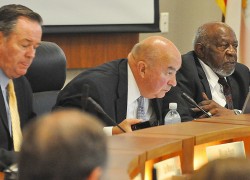
The Cal State U. Board of Trustees held a discussion about its executive hiring and compensation policies after recently drawing criticism for awarding San Diego State President Elliot Hirshman a $400,000 salary.
The meeting addressed some of the effects of statewide hardships on the education system and, consequently, decisions regarding executive positions.
Unlike the meeting that raised tuition and finalized Hirshman’s salary, the audience was sparse and contained no student protesters or representatives.
Chancellor Charles B. Reed began with a presentation that attributed much of California’s education problems to the size and scope of the state, as well as the cost of living.
“It’s getting to be a huge problem,” Reed said.
The criteria for the presidential hiring process include the applicant’s motive for seeking the job, their leadership priorities and a particular institution’s desired qualities.
During the last 33 years, 17 percent of presidents and chancellors were discovered through a job advertisement, while 83 percent came from a nomination by the Board of Trustees or a direct invite.
Following Reed’s presentation, outside corporate consultant Jaime Ferrar answered questions directly from the Board, and spoke about the nature of campus presidency.
“When you’re doing a presidential search, it’s a great opportunity to say to the world, ‘Hey, look at us! Look how great we are!”‘ Ferrar said.
Ferrar said the decision of choosing a campus president speaks not only for the school’s name, but for its donors, faculty and students, as well.
“That’s the impact,” Ferrar said. “It’s not just about the candidate, but about the institution and the community as well. We need strong, effective, viable leaders for higher education.”
Though candidates are screened through an interview, their overall evaluation is based more on their past experience and credentials.
“The interview is important, don’t get me wrong, but there’s no question that it’s the least reliable of all the steps in the search,” Ferrar said. “The greater reliability of somebody’s eligibility is to look up their background information on public record.”
Despite the state’s economic woes, California is still an attractive option for prospective presidential candidates.
Ferrar said campus leadership strategies vary greatly from state to state, and applicants to the CSU system must be aware of what will work in California.
“California has a wonderful reputation for higher education,” Ferrar said. “[Candidates] believe resources are available to help them make a difference and they want to use their skill sets to help out. If a candidate is coming for salary, they’re coming for the wrong reasons.”
Board of Trustees member Roberta Achtenberg said the committee has been very solid in its past decisions when hiring executives.
“We haven’t chosen any bad presidents,” Achtenberg said.
California Faculty Association secretary John Halcon expressed disdain with the points addressed in the meeting.
“The CSU is being run like a corporation,” Halcon said. “We’re talking about corporate level salaries. Working for the CSU is a public service. You work for the public.”
Halcon said that it was irresponsible to award an inexperienced newcomer a significant salary increase from that of his senior predecessor.
However, he believed the complaints about Hirshman’s salary were more about the students than about executive compensation.
“The real issue is not so much if he’s worth it,” Halcon said, “but the rolling impact of additional charges to students, given the current economy.”
